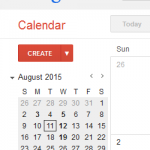Some people blog, or write articles for their website, because they’re literally overflowing with things to tell you about, and can’t keep quiet. They probably have a carefully thought-out plan, but they know what people want to hear, so put the time into giving it to them.
If you’re more the type of person who sits and stares at their screen, for a while, then goes and does something else instead of blogging, then here are some tips to help you become like the other kind of blogger.
 First, think about your business as an outsider
First, think about your business as an outsider
It’s not easy, but use this perspective to make a list of possible topics. Here are some headings to help you:
Things you know that other people don’t
You might be an expert on types of fabric, if you have a material shop. You could talk about what’s best for different craft or dressmaking projects, what threads to use, how to set up your sewing machine to accommodate different types of material. What is your area of expertise? Think about the FAQs you receive, and expand on those answers.
Things that happen in your world that others might find interesting
If you work in the wedding business, you will have stories of different types of weddings you’ve been involved with. You could do comparative pieces on different venues, or styles of photography perhaps. There might be funny stories, but be careful not to laugh at your customers too much, or give details that will allow people to identify who you’re referring to. You will put people off.
Things that will help people understand your product or service better
If you sell a particular product, you might like to write about why your product is different from other people’s, what sets your business apart, the background to your product, perhaps the history of beer from when people first discovered things fermented, if you’re a brewery.
These can be the basis of your plan.
 Secondly, think about what’s new and exciting in your world that you can tell people about
Secondly, think about what’s new and exciting in your world that you can tell people about
Do you have new products? Are you launching a new service?
Is there legislation or regulation coming in that will impact you, or your customers? Is there innovation or development in your field?
Are there bigger-picture changes afoot that will make your customers ask questions that you can answer for them?
What’s in the national or local press that’s relevant to your business and customers, that you can write about?
Have you got new staff, especially staff your customers might interact with? They could write a blog saying ‘hi’ and talking about who they are, what they can bring to your business, and how excited they are (presumably).
Have you had articles published in paper or online media recently? Point people towards them.
Have you won any awards? You’re entitled to go a little nuts over those!
Is there anything on the calendar that you can tie in with – spring cleaning, a Royal Jubilee, New Year’s resolutions, Christmas, end of the tax year, National hug-a-friend day…?
And there’s another whole batch of blog topics for you!
 Thirdly, can you involve your customers?
Thirdly, can you involve your customers?
Are there customer testimonials you can use, or can you go and get some? Are there customers you can film, or ask to be part of an interview, while you talk to them about why they have been doing business with you, and the benefits that has brought them?
Can you run a competition? That’s several posts right there – announcing it, reminding people, a ‘just 2 more days’ post, and then announcing the winner.
At risk of getting into another ‘Boaty McBoatface’ scenario, do you have a new cocktail, ice-cream flavour, jewellery design, or holiday cottage that you can invite naming suggestions for? Ask for suggestions rather than holding a ballot, maybe… Perhaps offer a free taste for the winning suggestion, if it’s edible.
So, now you have your ideas… what next?
I’m a bit of a lists girl, so my first thought is to put all your ideas into a spreadsheet. You may prefer a paper list, a swirly mind-map, a flipchart, or post-it notes on a wall. However you do it, get the ideas outside your head in some format.
Categorise them by type – how to’s, customer stories, FAQs, new products, etc, then arrange them into some sort of order. You want to vary your content, your readers will get bored of how-to articles for 5 consecutive posts, then a concentrated burst of customer stories. Mix it up, and keep it interesting.
 Then get your list lined up a little, alongside a calendar. (You’re beginning to see why I like a spreadsheet approach, now, aren’t you!) Work out how many posts you want per month or per week. If your pre-Christmas special offer runs throughout November, you want something mentioning it towards the end of October, and again in the middle of November, to make sure people know. Maybe even a ‘hurry, last 2 days’ post too.
Then get your list lined up a little, alongside a calendar. (You’re beginning to see why I like a spreadsheet approach, now, aren’t you!) Work out how many posts you want per month or per week. If your pre-Christmas special offer runs throughout November, you want something mentioning it towards the end of October, and again in the middle of November, to make sure people know. Maybe even a ‘hurry, last 2 days’ post too.
If you’re blogging once a month, you can probably plan most of a year in one go, sticking to big topics and events, covering a few things in one post, but handling them lightly.
If your aim is to become an acknowledged expert on your subject, you need to be more frequent than that, maybe post several times a week, if you can. You can afford to post short posts, covering a single topic, and treat your blog like a 2-minute how-to. An obvious example of this is You-Tube hair or make-up tutorials, where you can watch someone show you how to make your eyes look glamorous for an evening out, or demonstrate seven or eight different style of eyeliner.
The important thing to remember is that you are blogging for YOU
Your business will benefit from increased traffic to your site, drawn there by your blog. However you don’t want to give away all your professional tricks of the trade. You’re aiming to make people say ‘ah, yes, she knows what she’s talking about, I’ll get her make my wedding cake for me’, rather than ‘ah, now I know how to make a totally professional, utterly fabulous wedding cake, so I’ll do it myself’. But you still want them to say ‘ah, now I can get the icing smooth’. It’s a fine line!
Top tips
- Write attention-grabbing titles to your blogs. ‘10 top tips for…’ always works, for instance.
- Video and images are good. Vary it, but never use just words all the way down the page.
- Get someone else to help you with ideas, if you’re truly stuck.
- Read my ‘6 top tips to start writing‘ blog post, if you’re staring at a blank page, and it’s pulling faces at you and laughing.
- Read my ‘how to outsource your blogging’ page, if the whole idea terrifies you, or you simply don’t have time.
Thanks for reading!

Leave a Reply